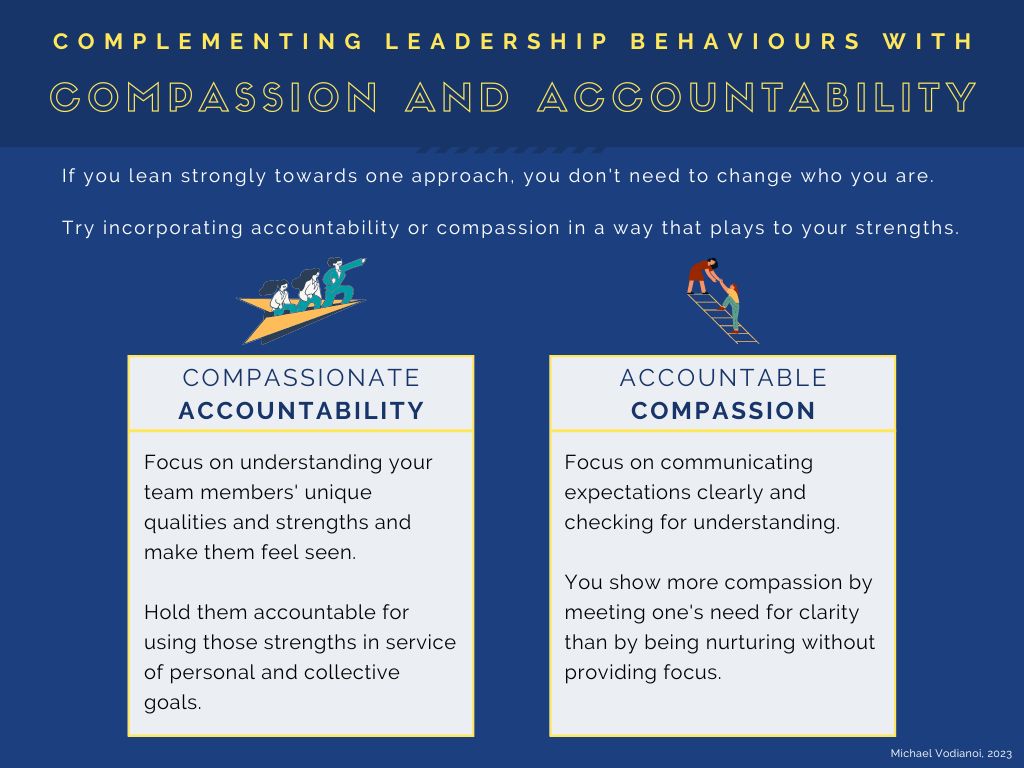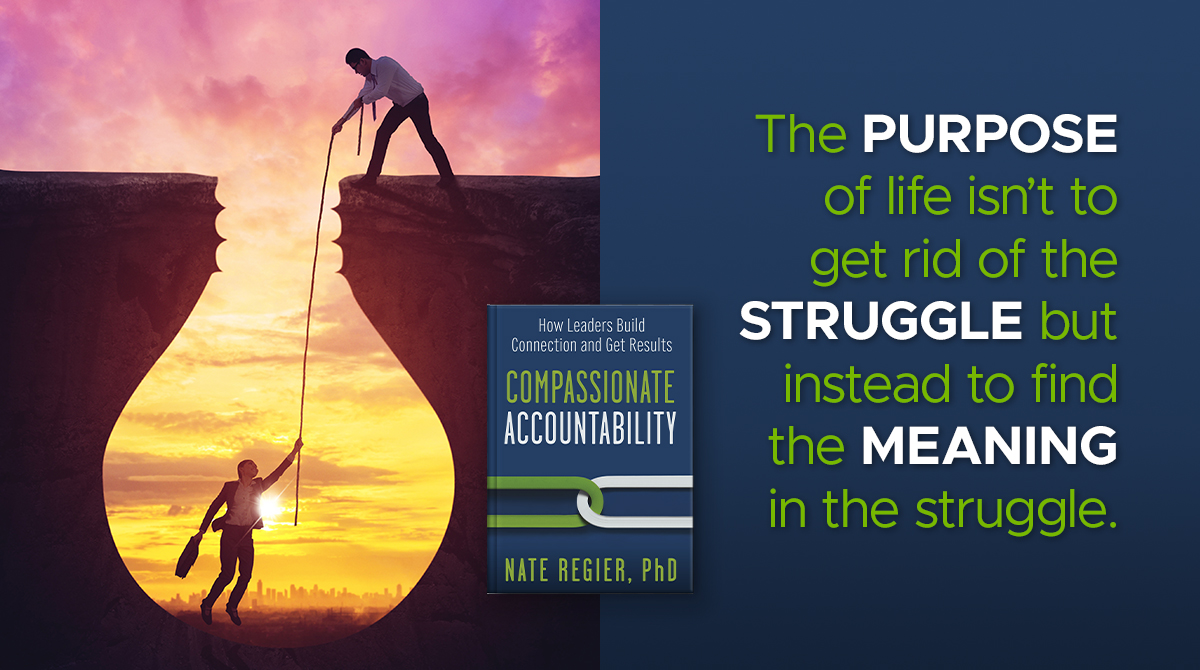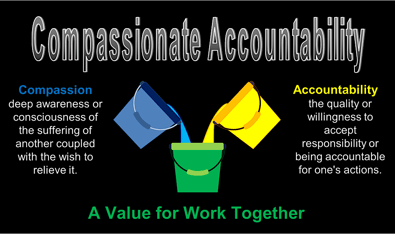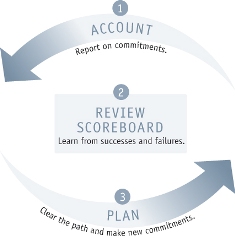In our last blog Compassionate Accountability - Difference between Accountability and Responsibility, we shared how Compassionate Accountability is the process of building connection while also getting results. Frequently leaders get confused about balancing accountability and compassion when they need to be part of the same objective.
 Compassionate in Latin means to suffer or struggle with, it does not mean to take away suffering.
Compassionate in Latin means to suffer or struggle with, it does not mean to take away suffering.
Recent research indicates, as we shared in Character Skills, Accelerate Growth by Amplifying Discomfort – Hidden Potential, discomfort accelerates growth.
Compassionate accountability is understanding and providing help to those you lead, while still making them responsible for meeting the standards and behavior the position requires to meet your team’s business objectives.
You Don’t Have to Choose or Compromise
Several years ago, Nate Regier, author of Compassionate Accountability: How Leaders Build Connection and Get Results, engaged with a national service company to build compassionate accountability with their 250 regional call center managers.
These managers worked remotely, supporting, and supervising a national network of agents serving customers daily.
The most consistent complaint among the call center managers was they felt drained by their interactions with the agents they supervised.
One-on-one meetings led to temporary improvements, but many agents didn’t sustain the changes.
 The managers believed they were doing all they could to support their agents, offering solutions and second chances in the hope things would get better.
The managers believed they were doing all they could to support their agents, offering solutions and second chances in the hope things would get better.
Many managers dreaded conversations around performance metrics.
To practice compassionate accountability, the author engaged the managers to pay equal attention to three fundamental components in every interaction: value, capability, and responsibility.
Managers were asked to evaluate their behavior according to these three criteria:
- What behaviors affirm and uphold your value as a human? What behaviors affirm and uphold the value of your agents?
- What behaviors affirm and uphold your capability as a manager? What behaviors affirm and uphold the capability of your agents?
- What behaviors affirm and uphold your responsibility as a manager? What behaviors affirm and uphold the responsibility of your agents?
Avoiding Drama – Leading with Compassionate Accountability
Drama happens when you respond to conflict by struggling against yourself or another, with or without awareness, to feel justified about your unhealthy behaviors.
When it comes to drama, we set up win-or-lose situations. That’s not compassion.
Most drama is habitual. Compassion is intentional. With drama, we seek justification rather than what’s best for all. Drama is self-serving while compassion pays equal attention to self, others, and the greater good.
“Those who plan the battle rarely battle the plan.” ~Ken Blanchard
Responsibility doesn’t exist in a vacuum. Inviting higher levels of responsibility can occur only when we also tend to value and capability.
 To correct the responsibility gap, leaders shared explicit standards, reviewed the numbers, and discussed the consequences of failing to meet the standards. (Here’s the script they were asked to follow):
To correct the responsibility gap, leaders shared explicit standards, reviewed the numbers, and discussed the consequences of failing to meet the standards. (Here’s the script they were asked to follow):
I’m struggling with something, and I want your help. I’ve been feeling drained from our interactions and don’t feel effective as a manager. I realize that I’ve been working so hard to support you and solve your problems that I haven’t allowed or expected you to be part of the solution. I’m interested in your ideas about how you can consistently close the gap. I haven’t done right by our organization either because I haven’t held myself or you accountable to meet its goals. Meeting your performance goals is nonnegotiable, and we have standard consequences that I will begin to enforce. I care about you, and I want you to be successful.
Instead of struggling alone, against, or instead of, these managers redefined what it means to struggle with.
They showed compassion and accountability without compromise or drama.
RESULTS
Four months after the training, a check-in meeting to report on progress, share stories, and answer questions. Outcomes from data collected from the 250 managers were also shared.
In all four areas, they reported over 50 percent improvement over and above everything else they were doing. Here are just three of the comments from managers:
- “With a few surprisingly simple changes in my approach, a chronically underperforming manager has met or exceeded her performance metrics for four months in a row.”
- “My employees used to dread our check-ins. Now we both experience them as ‘We are in this together.’ I have so much more positive energy.”
- “An eye-opener when learning new ways to recircuit my brain to a better understanding of bringing a situation to a satisfactory conclusion on both sides.”
 In my first managerial position, as a sales manager, I nearly lost my job after my first year. I turned around my performance and the performance of my team by having my salespeople create a simple 3X5 Index Card. On one side were their goals, on the other side were the activities they needed to do each week to achieve them. In our weekly one-on-one meetings, I would ask them if they were achieving their activities. This always got the same response when they weren’t. There was a nod, a sense of disappointment, and a renewal of their efforts to reach their activities. They had set their goals. They were inspired and motivated to reach them.
In my first managerial position, as a sales manager, I nearly lost my job after my first year. I turned around my performance and the performance of my team by having my salespeople create a simple 3X5 Index Card. On one side were their goals, on the other side were the activities they needed to do each week to achieve them. In our weekly one-on-one meetings, I would ask them if they were achieving their activities. This always got the same response when they weren’t. There was a nod, a sense of disappointment, and a renewal of their efforts to reach their activities. They had set their goals. They were inspired and motivated to reach them.
Before they left our meeting, I would always receive a confirmation of their plan to achieve the actions they had committed to!
To create an environment where everyone is inspired to give their best, contact Positioning Systems to schedule a free exploratory meeting.
Turn your team into a growth organization.
Growth demands Strategic Discipline.
 Your brand is a lagging indicator of the quality of your culture. Culture is the sum of all the interactions between your people. The action is in the interaction. To create a thriving culture and strong brand, embed compassionate accountability within every interaction. Compassion is the practice of demonstrating that people are valuable, capable, and responsible in every interaction. Next blog - The Compassionate Mindset.
Your brand is a lagging indicator of the quality of your culture. Culture is the sum of all the interactions between your people. The action is in the interaction. To create a thriving culture and strong brand, embed compassionate accountability within every interaction. Compassion is the practice of demonstrating that people are valuable, capable, and responsible in every interaction. Next blog - The Compassionate Mindset.
Building an enduring great organization requires disciplined people, disciplined thought, disciplined action, superior results, producing a distinctive impact on the world.
 Discipline sustains momentum, over a long period of time, laying the foundations for lasting endurance.
Discipline sustains momentum, over a long period of time, laying the foundations for lasting endurance.
A winning habit starts with 3 Strategic Disciplines: Priority, Metrics, and Meeting Rhythms. Forecasting, accountability, individual, and team performance improve dramatically.
Meeting Rhythms achieve a disciplined focus on performance metrics to drive growth.
Let Positioning Systems help your business achieve these outcomes on the Four most Important Decisions your business faces:
|
DECISION |
RESULT/OUTCOME |
|
PEOPLE |
|
|
STRATEGY |
|
|
EXECUTION |
|
|
CASH |
|
Positioning Systems helps mid-sized ($5M - $500M+) businesses Scale-UP. We align your business to focus on Your One Thing! Contact dwick@positioningsystems.com to Scale Up your business! Take our Four Decisions Needs Assessment to discover how your business measures against other Scaled Up companies. We’ll contact you.
NEXT BLOG – The Compassionate Mindset






.jpeg?width=150&height=135&name=Hand%20with%20marker%20writing%20the%20question%20Whats%20Next_%20(1).jpeg)

